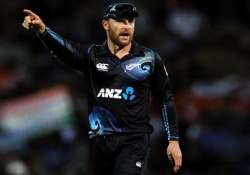World Cup 2015: New Zealand captain McCullum now the people's choice
Wellington, New Zealand: Brendon McCullum has enjoyed unprecedented success since his appointment as New Zealand cricket captain in 2012 — winning five of his last seven tests. Perhaps his greatest success in that time, though,

Wellington, New Zealand: Brendon McCullum has enjoyed unprecedented success since his appointment as New Zealand cricket captain in 2012 — winning five of his last seven tests. Perhaps his greatest success in that time, though, has been in winning the approval of the New Zealand cricket public.
His appointment was initially met with criticism from some fans, who have regarded him at best with grudging approval.
For some time in a career of prodigious individual achievement, and before his aggressive and inventive captaincy became a factor in New Zealand's team revival, McCullum was more highly regarded overseas than at home.
For several reasons, a large section of New Zealand fans were slow to warm to McCullum even when his performances, first in limited-overs matches then more regularly in tests saw him hailed as among the best batsmen in the world.
There are aspects of McCullum's personality which, in the past, have jarred with New Zealand sensibilities. He describes himself as "brash" but has sometimes been perceived by New Zealanders as arrogant, a major fault for Kiwis who expect their sports stars to behave with humility however well they perform on the world stage.
McCullum came into the New Zealand team with a substantial reputation but struggled at first to live up to expectations: his first test centuries were made against Zimbabwe and Bangladesh and it took five years before he scored his first against one of the eight more established test nations.
He has been slow to shake an image of inconsistency. McCullum has now scored 11 test centuries, including the first triple century by a New Zealander, three double centuries and other innings of 195, and 185.
But he has an average of 38.87 — 43.1 as captain — which reflects, to some extent, his mixed form and the various roles he has had to perform in the New Zealand batting lineup: from opening to batting at No. 7.
His naturally aggressive style also made McCullum vulnerable to criticism. At times he has appeared reckless, losing his wicket by hitting out at times when more circumspection was necessary.
McCullum also, through no fault of his own but because he was instantly in demand in the Indian Premier League, might have been seen by some New Zealanders as the epitome of the modern, more mobile and more mercenary professional cricketer.
He gave a face to the perception that cricketers increasingly place the income from lucrative Twenty20 Leagues ahead of playing for their country.
Lastly, McCullum became inextricably tangled in the controversy over the firing of his predecessor, Ross Taylor. The treatment of Taylor alienated many New Zealand cricket fans and efforts by coach Mike Hesson and New Zealand Cricket retrospectively to justify their handling of the issue appeared to lack credibility.
McCullum became embroiled in the controversy, not only because he was Taylor's successor but because of his long friendship with Hesson.
From that unpromising beginning, though, McCullum has grown to become one of New Zealand's most popular captains and players and Hesson is now respected as a successful coach. The two have jointly managed to create one of the most productive team environments in a New Zealand team, at least since the 1980s: egos have generally been deflated and the culture of the team is mutually supportive.
"When it started I knew it was going to be tough," McCullum said. "Not everyone agreed with the decision (to remove Taylor) so I took over the job in extreme circumstances but felt I was the best candidate and the situation wasn't beyond repair.
"The first thing I did was crunch down what I believed was important to the team. What did we want to be known for? What were the key things people want to see when we play? As a result we've developed better fighting qualities."
The Black Caps open the World Cup in Christchurch against Sri Lanka on Saturday, and there's no doubt McCullum and his team will have New Zealand's full support.
"Sure, the New Zealand public wants to see us winning but it is more important to make it hard for the opposition to beat us, which is what we're seeing," McCullum said, explaining the recent transition. "Most of the changes came off the field."